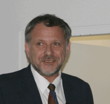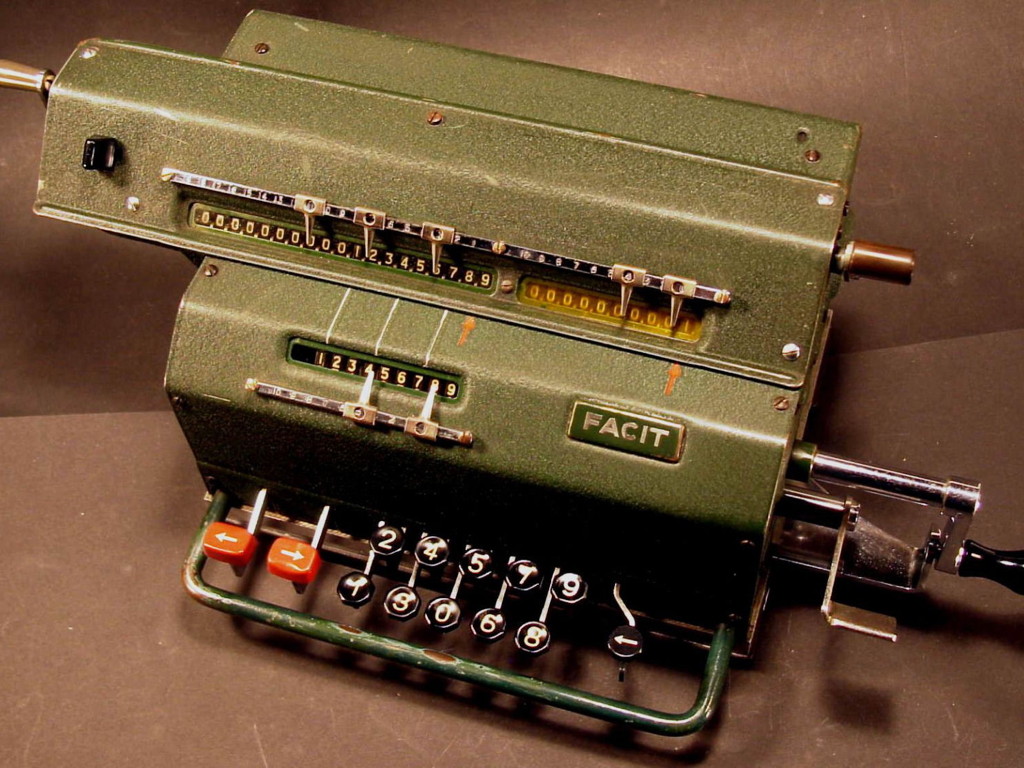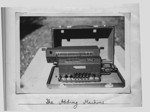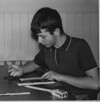Interview with Jim Falk (by his younger self)
I: So, you said you would give me the explanation of why you collect calculators.
J: I don’t think I promised ‘the explanation’.
I: I think you did! But we can let that pass. Why have you done this?
J: It was part of my job. Oh no, I am retired (sort of). Well, I guess it must just be fun.
I: Fun??? Calculators!! Come off it!
J: Well I could give you a story. Would that help?
I: Maybe.
J: When I was a kid - started it I think when I was 13 - I did a project for a thing called the “Science Talent Search” which in 1961 could get you a nice lot of money (£25), that was Australia’s currency then, if you won. (I did - I bought a movie camera with it - It had a clockwork motor!) I chose to do the first ever project on psychology. (I really wanted to do it on hypnotism but knew I would never get away with it.) Anyway, after subjecting 10 classmates to unending experiments - I wrote a 443 page thesis on “Pilot Experiments in Memory”. It had about 100 pages of statistics at the back, and someone lent me a Facit pinwheel calculator to help me add up, subtract, and square columns and columns of numbers. I loved that gadget! So one fateful day more recently I put “Facit calculator” into ebay. Found one, and bought it. And so it began….
I: Oh, so you were just a young nerd were you?
J: No, yes, oh maybe. I came bottom of the class in mental arithmetic, and failed geometry, if that helps?
I: Not really - but maybe explains why you liked the calculating machine - couldn’t do without it?
J: So you think that explains it?
I: Might.
J: No, really, that’s just one explanation. Why do you guys always want “the” story? Things are often more complicated.
I: So there’s more?
J: Sure, how much time have you got?
I: Not much, I do have to do lunch real soon. Could you just give me the drift?
J: OK, here’s another stab at it… Once upon a time. No I’d better take this seriously. The point is I graduated from Monash with an Honours degree in Science and went on to do a PhD in theoretical quantum physics. Completed it in 1974.
J: Oh and on the way I was a trainee programmer at Caterpillar in my second year at university in 1966, later was one half of the first computer help desk at Monash, and when doing my PhD used to operate the main frame computers at night for pay (and a chance to run my programmes all night.) And over that time I saw the tools of calculation go from mechanical calculators, log tables, and slide rules, to motorised machines, to the electronic wonder of the Hewlett Packard pocket scientific computers in 1972, which could do the lot. After that, all that had come before was gaslight! Now of course you can do it all in your iphone.
I: So you are a nerd. I knew it! Why not come clean about that in the first place? I mean who do you think you are fooling? It’s not entirely bad to be a propeller head, supposedly.
J: But that wasn’t all. I mean I had been heavily involved in student politics. I was President of the Student’s Representative Council in my second and third years, and I became a strong anti-Vietnam war activist. Even went to Vietnam in the middle of the war (Jan 1969) and got accreditation as a journalist.
I: Well thats a clue! I mean you Boomers still just can’t seem to be able to get over the 60s, can you? Protests, long hair, and drugs. I’ve read about it. I guess way back then it helped pull the chicks? Anyway, I don’t see how reminiscing about your youth as a “radical” gets us much closer to this thing about calculators (and look at you now), so maybe…
J: Hang on. There’s a link.
I: Look, it is lunch time… Don’t take this personally, but I have to interview someone who seriously matters after this… There is some meeting about a big potential contract between the University and Google…
J: I’ll try to be quick.
I: OK - could you please get on with it.
J: Well to cut it short.
I: Yes please.
J: When I finished my PhD I wasn’t entirely happy the way science had been used in Vietnam, and the environmental issues were beginning to surface, so I went and worked in environmental type activities - including for the Australian Conservation Foundation, and working for the Shadow Minister for Consumer Affairs. But in the end I had to decide which way I was going to jump - science or the other way. Crunch came in 1980 when I was offered jobs in Theoretical Quantum Chemistry at Monash, and in History and Philosophy of Science in the Arts Faculty at the University of Wollongong. I took the latter, and that, as they say, has made all the difference.
I: OK so you chose the soft stuff over the hard stuff did you?
J: Um…
J: Anyway at Wollongong I was employed to lecture on the politics and such like of modern science and technology. There I was surrounded by ‘real’ historians and philosophers of science (well a couple) who knew all sorts of other interesting things about how to think about that. So I learned a bit about that too. By 1989 I was Head of what was now the Department of Science and Technology Studies (STS). So I was in an environment where people professionally look at the history of technology and science, and how innovation happens. If you really want to know about any of this stuff I did and do you could look here or for the more recent stuff here.
I: No, thanks. We’ve already had quite enough of that.
I: So to summarise you went from nerd to a sort of mixed up soft geek who has got into a bit of steam punk. I get it. But it doesn’t seem to have helped you. It just seems to have left you all confused about these calculators and why you collect them.
J: Well, that seems a bit blunt.
I: Anything else?
J: Only that after that from 1996 I became a ‘senior’ university executive (‘Deputy Vice-Chancellor’ - that sort of stuff ) at a couple of universities (where amongst other things I had responsibility for their IT developments). But you know research is much more interesting! So in 2004 I went back to found and run a new research outfit at the University of Melbourne - the Australian Centre for Science, Innovation and Society. So you can tell by the name that it was about technological innovation amongst other things. Kicked the habit at the beginning of 2011. So I no longer have to run round with a collection plate for funding the Institute. What a relief! I’m still a Professorial Fellow here with this office, but not many responsibilities, and also I’m free to do other things.
I: So now you are out in the pasture, you have all the time in the world, instead of having to do serious work to do things, however pointless (if you’ll excuse me saying so), like collect the calculators and do this website?
J: Sort of. I still am involved in research on climate change, I’m a “Visiting Professor” at the United Nations University and an Emeritus Professor at the University of Wollongong. I still write on various issues and am an Affiliate Researcher with the Melbourne Sustainable Society Institute. My latest book (with Joseph Camilleri) is “Worlds in Transition: Evolving Governance Across a Stressed Planet”.
I: Yes, well, I suppose thats nice, if you must be, well sorry, an egg head. But why retire if you are going to do that? You don’t seem to have thought it through very well. Anyway, can’t really see what it has to do with calculators.
J: Well one of my most cited articles is from 1995 on “The Meaning of the Web” and the new book has a long chapter I wrote on the evolving governance of information.
I: Can’t say that says much about calculators! That’s drawing a long bow isn’t it?
J: OK - well my father, who was a philosopher, used to collect old art works - from ancient Egypt and China. They were amazing - ancient elegant survivors of an age otherwise beyond our reach. They seemed so magic to me as a kid. So I collect calculators.
I: Well that seems like two completely different things entirely! I don’t see the connection.
J: OK, maybe this will do - the calculators have helped me understand the history of calculation, and the history of calculation has helped me decide what I wanted to actually have in my hands.
I: Yes - but isn’t that just an excuse? Do you really need to HAVE these things to just write a history?
J: Look, I like calculators, especially the old ones, OK?
I: Whatever. I have to run to lunch. Some of us still have real jobs to do. If I have any more questions I’ll text you. OK?
J: Well have you got what you want?
I: Look, its not what I expected. I thought you would tell me why you have collected these calculators. But it seems like you don’t know. It’s more like the calculators have collected you.
J: Why do you think mathematicians do mathematics?
I: Beats me. Why do normal people watch sport?
J: OK well why do they buy sports cars?
I: Well thats obvious. Sports cars are right at the edge of engineering, design and style - really neat. I’ve got one of the old Austin Healey Sprites. Really fun! Would loosen you up a bit, maybe. What has that got to do with collecting calculators? One of the reasons you seem so weird is you are forever trying to change the subject.
J: Well we have big problems like climate change which need a whole lot of innovation to solve. So maybe we can learn something about how collectively, we as humans, got faster and better at solving the calculation problem? Maybe solving one depends on solving the other? I mean isn’t calculation a crucial tool in our evolving capacity for governance?
I: You’ve lost me. Is that the sort of stuff you feed your students? Like footnotes are going to change the world?
J: So do you still want to write this article?
I: It was supposed to be a “human interest” story, but to be frank I’m not sure how either of those words apply to you. Maybe I can do something with this. But don’t hold your breath. Have to see how the Editor responds. I’ll text you if I do write anything. No need to contact me. Bye.
 |  |  |  |
| Jim 2012 | Facit LX acquired in 2014 | “The adding machine” 1961 | Jim (“James”) 1961 |
